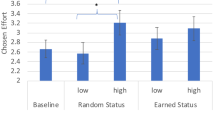Abstract
Ninety-five freshmen each recruited three peers to play a "group bidding game," an N-person prisoner’s dilemma in which anyone could win movie tickets depending on their scores in the game. Prior to playing, all participants completed a measure of prosocial value orientation. Replicating and extending earlier findings (Sheldon and McGregor 2000), our results show that prosocial participants were at a disadvantage within groups. Despite this vulnerability, prosocial participants did no worse overall than asocial participants because a counteracting group-level advantage arose for prosocials, who tended to be concentrated in groups. Implications of this assortative process for the egoism/altruism debate, and for hierarchical selection theory, are discussed.
Similar content being viewed by others
References
Axelrod, R. 1984 The Evolution of Cooperation. New York: Basic Books.
Brewer, M. B., and R. M. Kramer 1986 Choice Behavior in Social Dilemmas: Effects of Social Identity, Group Size, and Decision Framing. Journal of Personality and Social Psychology 50:543–549.
Bryk, A. S., and S. Raudenbush 1992 Hierarchical Linear Models for Social and Behavioral Research: Applications and Data Analysis Methods. Newbury Park, California: Sage.
Caporael, L. R., and M. B. Brewer 1995 Hierarchical Evolutionary Theory: There Is an Alternative, and It’s Not Creationism. Psychological Inquiry 6:31–34.
Caporael, L. R., R. M. Dawes, J. M. Orbell, and A. J. Van de Kragt 1989 Selfishness Examined: Cooperation in the Absence of Egoistic Incentives. Behavioral and Brain Sciences 12:683–739.
Dawkins, R. 1977 The Selfish Gene. New York: Oxford University Press.
Hamilton, W. D. 1964 The Genetical Evolution of Social Behavior. Journal of Theoretical Biology 7:1–52.
Hardin, G. 1968 The Tragedy of the Commons. Science 162:1243–1248.
Kasser, T., and R. M. Ryan 1993 A Dark Side of the American Dream: Correlates of Financial Success as a Central Life Aspiration. Journal of Personality and Social Psychology 65:410–422.
1996 Further Examining the American Dream: Well-being Correlates of Intrinsic and Extrinsic Goals. Personality and Social Psychology Bulletin 22:281–288.
Kasser, T., R. M. Ryan, M. Zax, and A. J. Sameroff 1995 The Relations of Maternal and Social Environments to Late Adolescents’ Materialistic and Prosocial Values. Developmental Psychology 31:907–914.
Kenny, D. A., D. Kashy, and N. Bolger 1998 Data Analysis in Social Psychology. In The Handbook of Social Psychology, Vol. 1, fourth ed., D. T. Gilbert, S. T. Fiske, and L. Gardner, eds. Pp. 233–265. Boston: McGraw-Hill.
Komorita, S., and C. Parks 1994 Social Dilemmas. Madison, Wisconsin: Brown and Benchmark.
Lee, V. 1998 Course Material from "Multilevel Analysis of Survey Data." Ann Arbor: Institute of Social Research.
Ryan, R. M. 1995 Psychological Needs and the Facilitation of Integrative Processes. Journal of Personality 63:397–427.
Schwartz, S. H. 1996 Value Priorities and Behavior: Applying a Theory of Integrated Value Systems. In The Psychology of Values: The Ontario Symposium, Vol. 8, C. Seligman, J. M. Olson, and M. P. Zanna, eds. Pp. 1–24. Mahwah, New Jersey: Lawrence Erlbaum.
Sheldon, K. M., and T. Kasser 1995 Coherence and Congruence: Two Aspects of Personality Integration. Journal of Personality and Social Psychology 68:531–543.
Sheldon, K. M., and H. McGregor 2000 Extrinsic Value Orientation and the "Tragedy of the Commons." Journal of Personality 68:383–411.
Simpson, E. H. 1951 The Interpretation of Interaction in Contingency Tables. Journal of the Royal Statistical Society 13:238–241.
Sober, E., and D. S. Wilson 1998 Unto Others: The Evolution and Psychology of Unselfish Behavior. Cambridge: Harvard University Press.
Tooby, J., and L. Cosmides 1992 The Psychological Foundations of Culture. In The Adapted Mind: Evolutionary Psychology and the Generation of Culture, J. H. Barkow, L. Cosmides, and J. Tooby, eds. Pp. 19–136. New York: Oxford University Press.
Trivers, R. L. 1971 The Evolution of Reciprocal Altruism. Quarterly Review of Biology 46: 35–57.
Williams, G. C. 1966 Adaptation and Natural Selection: A Critique of Some Current Evolutionary Thought. Princeton: Princeton University Press.
Wilson, D. S. 1997 Incorporating Group Selection into the Adaptationist Program: A Case Study Involving Human Decision Making. In Evolutionary Approaches to Personality and Social Psychology, J. Simpson and D. Kendrick, eds. Pp. 345–386. Hillsdale, New Jersey: Erlbaum.
Wilson, D. S., and L. A. Dugatkin 1997 Group Selection and Assortative Interactions. American Naturalist 149:336–351.
Wilson, D. S., and E. Sober 1994 Reintroducing Group Selection to the Human Behavioral Sciences. Behavioral and Brain Sciences 17:585–654.
Wilson, D. S., D. Near, and R. R. Miller 1996 Machiavellianism: A Synthesis of the Evolutionary and Psychological Literatures. Psychological Bulletin 119:285–299.
Wynne-Edwards, V. C. 1962 Animal Dispersion in Relation to Social Behavior. Edinburgh: Oliver and Boyd.
Author information
Authors and Affiliations
Corresponding author
Additional information
Ken Sheldon is an assistant professor of social psychology at the University of Missouri-Columbia. He received his Ph.D. from the University of California-Davis in 1992. His research interests include motivation, goals and values, well-being and personality development, social dilemmas, and the intersection of these issues.
Melanie Sheldon is a graduate student in social psychology at the University of Missouri-Columbia. Her research interests include hormonal influences on gender, evolutionary psychology, sex differences, and risk behavior.
Richard Osbaldiston is a graduate student in social psychology at the University of Missouri-Columbia. His research interests include environmental psychology, motivation theory, and social dilemmas.
Rights and permissions
About this article
Cite this article
Sheldon, K.M., Sheldon, M.S. & Osbaldiston, R. Prosocial values and group assortation. Hum Nat 11, 387–404 (2000). https://doi.org/10.1007/s12110-000-1009-z
Received:
Accepted:
Issue Date:
DOI: https://doi.org/10.1007/s12110-000-1009-z




